The CrimeReads editors select their favorite new fiction this month.
*
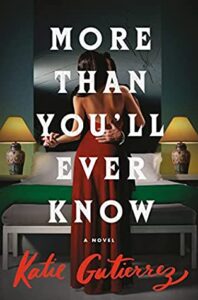
Katie Gutierrez, More Than You’ll Ever Know
(William Morrow)
In Katie Gutierrez’s powerhouse debut, a woman with two husbands loses one to the violence of the other, and a true crime writer uncovers shocking secrets decades after. I love this book more than Delores “Lore” Rivera loves both her families and now you have to read this book to understand what I mean. –Molly Odintz, CrimeReads Senior Editor

Chris Offutt, Shifty’s Boys
(Grove)
Offutt’s powerful follow-up to The Killing Hills is just as rich in atmospherics and a master-class in the craft of crime fiction. Mick Hardin is back in the Kentucky hills, with his sharp military training and his deep family roots leading him inevitably toward a spot of trouble, this time in the form of a local heroin dealer found dead and a mother whose grief can’t accept official disinterest in the case. Offutt has created a wildly compelling private eye series full of memorable characters, drawn with an observant eye and a passion for the local terrain. –Dwyer Murphy, CrimeReads Editor-in-Chief
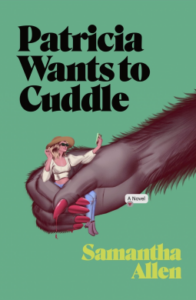
Samantha Allan, Patricia Wants to Cuddle
(Zando)
This is the lesbian Sasquatch novel you’ve always wanted. A group of finalists for a Bachelor-style show head to a remote British Columbian island to film the final episodes of the contest. While there, they encounter a female Bigfoot and her coterie of admirers, and those that do not admire her (as they properly should) are torn limb from limb because this is the most badass book imaginable. Patricia is the Sasquatch, by the way. The publisher describes it as “viciously funny” but I thought it was also kinda sweet. I’d give Patricia a cuddle. –MO

Caroline Woods, The Lunar Housewife
(Doubleday)
Woods offers up a heady mix of espionage, historical fiction, and literary mystery with The Lunar Housewife, set in a richly-evoked midcentury downtown New York literary scene, where her protagonist finds herself somewhere at the intersection of the artistic vanguard and the spymaster’s crosshairs. The story follows the arc of a new literary magazine in which the government has taken a keen interest, leading to a swirl of paranoia and double-crosses. –DM

Joey Hartstone, The Local
(Doubleday)
In this small town legal thriller that also happens to feel very noir, a federal judge in a tiny Texas community has managed to make his court a hub of intellectual property law that draws lawsuits from across the nation. Each big city law firm finds, to the dismay of its pressed and tailored lawyers, that it needs a local attorney to sway the jury in favor of any case. That’s where the sleezy sleuth of The Local comes in, cashing in and boozing away his winnings until the murder of the judge, who also happens to be his father figure, sends him on the long, sober path to the truth. –MO

Riley Sager, The House Across the Lake
(Dutton)
Riley Sager’s latest takes place on the banks of a lake, the most disturbing of all bodies of water as readers of this site should well know. The House Across the Lake reads like a psychological thriller version of the Great Gatsby, featuring binoculars for more accurate across-the-lake spying, smaller gatherings for a shorter list of suspects, and a truly bat**** twist for more satisfying consumption. So basically the Great Gatsby, but better. I know, them’s fightin words. Shout-out to this one for the mid-story reversal—I love a good shift in gears to somewhere wholly unexpected. –MO
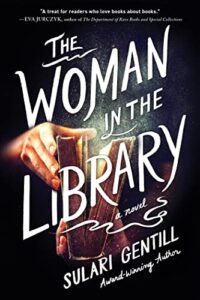
Sulari Gentill, The Woman in the Library
(Poisoned Pen Press)
Sulari Gentill, the author of the delightful Rowland Sinclair books, has penned a fascinating, very meta new mystery that walks the line between impressive literary experiment and gripping murder story. Winifred “Freddie” Kincaid, an Australian writer, is in Boston on a fellowship when, one day in the library, she hears a woman scream, and is inspired to write a story about it. Hannah Tigone is an Australian novelist writing the mystery about Freddie writing the mystery in the library. And Leo is Hannah’s biggest fan, writing countless emails to her that inadvertently influence the ways Hannah tells the story, until Leo’s own story is rejected and his presence in the writerly web grows far more dangerous. Yeah, you don’t want to miss this. –Olivia Rutigliano, CrimeReads Associate Editor
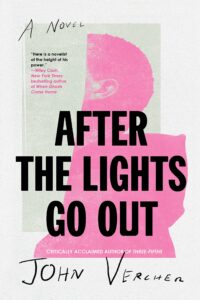
John Vercher, After the Lights Go Out
(Soho)
John Vercher’s new novel of an MMA fighter on his last legs is just as depressing as you think it’d be (after all, don’t we turn to stories of aging fighters precisely because they are so bleak?). I will say, that if you don’t at least tear up while you read this, then you are a heel who deserves all the boos the crowd can throw at you. Oh, for those who need to know this before you start reading, the Dog Does Not Die. –MO

Paraic O’Donnell, The Maker of Swans
(Tin House)
O’Donnell mesmerizes with another stylish, atmospheric tale, this one melding elements of a traditional country manor murder mystery with deep strands of gothic fiction’s occult obsessions. A butler wandering the grounds of an estate witnesses a murder, an event that gives occasion to recount the strange history of his employer’s one-time association with various secret societies, eultural elites, and would-be practicioners of the dark arts. The Maker of Swans is a remarkable and deeply unsettling novel. –DM

Elly Griffiths, The Locked Room
(Mariner)
The new Ruth Galloway novel from Elly Griffiths’ starts in the most relatable moment of any recent mystery novel: during the COVID-19 pandemic. In Norfolk to figure out the meaning of a photograph left by her late mother, forensic anthropologist Ruth winds up looking into the cause of death behind the skeleton found in a Medieval cemetery, while her (kind of) boyfriend Det. Chief Insp. Harry Nelson investigates a string of murder-suicides. But then, as the pandemic rears its head, they wind up sheltering-in-place in potentially the most dangerous place they could possibly be. –OR
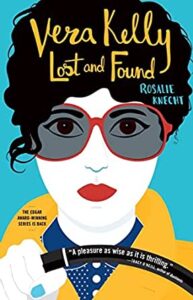
Rosalie Knecht, Vera Kelly Lost and Found
(Tin House)
Vera Kelly is back! If you’re not reading her rolicking adventures from spy-hood to PI-dom, you absolutely should. In this third installment, which takes place in the spring of 1971, Vera and her girlfriend Max head to Los Angeles to visit Max’s estranged family, now in ruins. Max’s parents are divorcing, her father is engaged to a younger woman and is being influenced by “an occultist charlatan” (via the book description but I love this phrase), her mother has up and left, and soon, Max herself winds up missing. And Vera is the only one who can find her. –OR

















